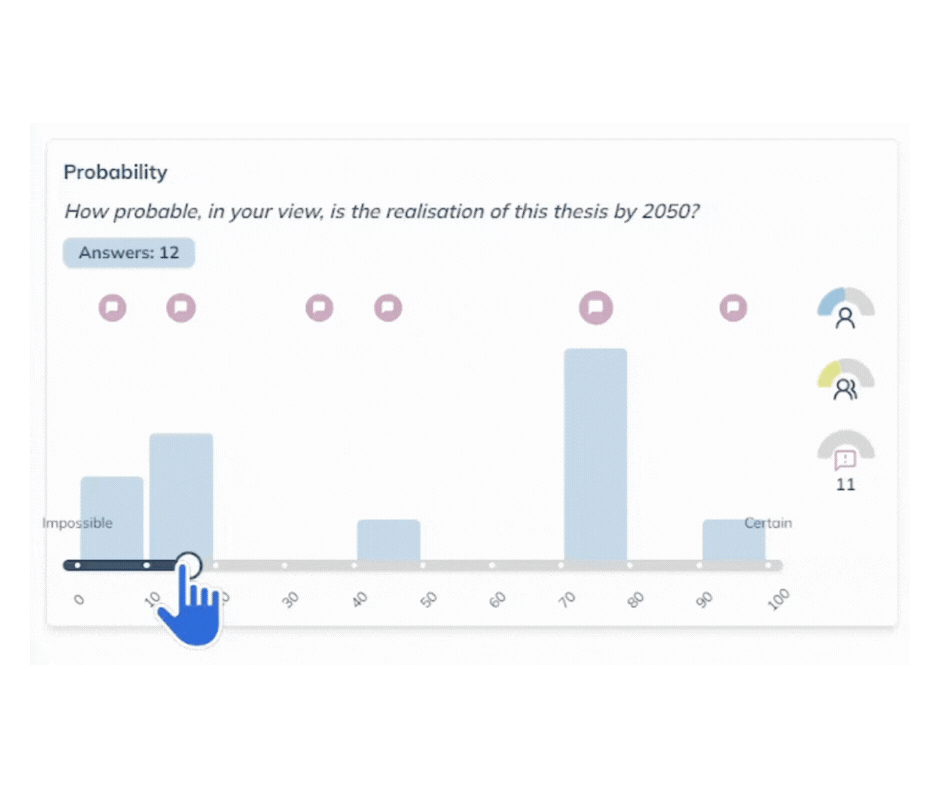Expert overconfidence: Addressing the ‘hedgehog’ problem in Delphi panels

The Delphi method is a powerful tool for harnessing collective intelligence, relying on the structured input of experts to navigate complex problems and forecast uncertain futures. Its strength lies in bringing together diverse knowledge and perspectives. However, simply assembling a panel of experts doesn’t guarantee accurate insights. A critical challenge lies in the nature of expertise itself, particularly the often-misleading relationship between an expert’s confidence and their actual predictive accuracy. Understanding this challenge, famously explored by Philip Tetlock through his “hedgehog” and “fox” typology, is crucial for designing and facilitating effective Delphi studies.

The Delphi promise: Harnessing expert insight
At its core, Delphi aims to leverage the knowledge of informed individuals while mitigating the biases inherent in traditional group discussions. Through principles like anonymity, iteration, and structured feedback focused on reasoning, it seeks to distill collective wisdom and move towards reasoned consensus. The selection of participants with relevant expertise is fundamental to this process. But what constitutes valuable expertise, especially when dealing with complex, uncertain futures?

The confidence conundrum: Enter the hedgehog
Decades of research into expert judgment, notably Philip Tetlock’s landmark work documented in “Expert Political Judgment,” reveal a fascinating and often counterintuitive reality. Tetlock found that experts exhibit different cognitive styles, which he famously categorized as “hedgehogs” and “foxes”:
![]() Hedgehogs: Know “one big thing.” They tend to view the world through the lens of a single overarching theory or framework, applying it broadly. They often express their forecasts and judgments with high degrees of confidence.
Hedgehogs: Know “one big thing.” They tend to view the world through the lens of a single overarching theory or framework, applying it broadly. They often express their forecasts and judgments with high degrees of confidence.
![]() Foxes: Know “many little things.” They are more eclectic, drawing on multiple perspectives and sources of information. They tend to be more cautious, comfortable with nuance and complexity, and more likely to acknowledge uncertainty in their judgments.
Foxes: Know “many little things.” They are more eclectic, drawing on multiple perspectives and sources of information. They tend to be more cautious, comfortable with nuance and complexity, and more likely to acknowledge uncertainty in their judgments.
The crucial finding was that, particularly for complex, long-term forecasting, the more cautious, adaptable “foxes” consistently outperformed the highly confident “hedgehogs.” High confidence, it turns out, is often a poor predictor of accuracy in uncertain domains.

Why this matters for Delphi panels
This “hedgehog problem” poses significant risks for the validity and effectiveness of Delphi studies:
![]() Panel selection bias: If expert selection relies heavily on reputation (often built on confident pronouncements) or simplistic views of expertise, there’s a risk of over-selecting confident “hedgehogs” while potentially overlooking more circumspect but potentially more accurate “foxes”.
Panel selection bias: If expert selection relies heavily on reputation (often built on confident pronouncements) or simplistic views of expertise, there’s a risk of over-selecting confident “hedgehogs” while potentially overlooking more circumspect but potentially more accurate “foxes”.
![]() Counter-productive weighting by self-assessment: A practice employed in some Delphi studies – weighting participant inputs based on self-rated expertise or confidence – is methodologically flawed and potentially harmful. Research clearly demonstrates that an expert’s subjective confidence often has little or even a negative correlation with their actual accuracy on complex tasks. Therefore, weighting inputs based on these unreliable self-assessments risks systematically giving undue influence to potentially the least accurate participants (the overconfident “hedgehogs”) while marginalizing the contributions of more insightful but cautious “foxes.” This actively degrades the collective intelligence the method seeks to harness, potentially making the outcome worse than a simple aggregation.
Counter-productive weighting by self-assessment: A practice employed in some Delphi studies – weighting participant inputs based on self-rated expertise or confidence – is methodologically flawed and potentially harmful. Research clearly demonstrates that an expert’s subjective confidence often has little or even a negative correlation with their actual accuracy on complex tasks. Therefore, weighting inputs based on these unreliable self-assessments risks systematically giving undue influence to potentially the least accurate participants (the overconfident “hedgehogs”) while marginalizing the contributions of more insightful but cautious “foxes.” This actively degrades the collective intelligence the method seeks to harness, potentially making the outcome worse than a simple aggregation.
![]() Resistance to revision: The high confidence associated with the hedgehog style can sometimes translate into greater resistance to revising opinions, even when presented with compelling counter-arguments or diverging group views during the feedback rounds. This can anchor the discussion and skew the consensus-building process towards potentially flawed initial judgments.
Resistance to revision: The high confidence associated with the hedgehog style can sometimes translate into greater resistance to revising opinions, even when presented with compelling counter-arguments or diverging group views during the feedback rounds. This can anchor the discussion and skew the consensus-building process towards potentially flawed initial judgments.

Mitigation strategies: Designing for deeper insight
Addressing the risk of expert overconfidence requires careful methodological design and facilitation aimed at managing cognitive biases:
![]() Careful panel composition (seek the ‘Foxes’!): Effective mitigation starts with panel selection. Don’t just rely on credentials or reputation. Actively seek cognitive diversity alongside subject-matter expertise. Since research shows ‘foxes’ (adaptable, multidisciplinary, cautious thinkers) often outperform confident ‘hedgehogs’, explicitly aim to include more fox-like participants. How? Look beyond standard criteria during recruitment: seek out individuals with interdisciplinary backgrounds or experience applying multiple analytical frameworks; assess communication style in initial contacts – look for nuance, probabilistic language, and acknowledgment of complexity rather than absolute certainty; when using snowball sampling or seeking recommendations, ask nominators specifically about a candidate’s open-mindedness, intellectual humility, and analytical rigor; review public work (articles, presentations, if available) for evidence of balanced reasoning and consideration of alternatives versus rigid adherence to a single narrative. While perfectly identifying cognitive styles is impossible, these strategies can strengthen your panel against hedgehog-driven biases and groupthink.
Careful panel composition (seek the ‘Foxes’!): Effective mitigation starts with panel selection. Don’t just rely on credentials or reputation. Actively seek cognitive diversity alongside subject-matter expertise. Since research shows ‘foxes’ (adaptable, multidisciplinary, cautious thinkers) often outperform confident ‘hedgehogs’, explicitly aim to include more fox-like participants. How? Look beyond standard criteria during recruitment: seek out individuals with interdisciplinary backgrounds or experience applying multiple analytical frameworks; assess communication style in initial contacts – look for nuance, probabilistic language, and acknowledgment of complexity rather than absolute certainty; when using snowball sampling or seeking recommendations, ask nominators specifically about a candidate’s open-mindedness, intellectual humility, and analytical rigor; review public work (articles, presentations, if available) for evidence of balanced reasoning and consideration of alternatives versus rigid adherence to a single narrative. While perfectly identifying cognitive styles is impossible, these strategies can strengthen your panel against hedgehog-driven biases and groupthink.
![]() Careful question framing: Structure questions to encourage probabilistic thinking, consideration of multiple scenarios, and explicit acknowledgment of uncertainties and assumptions. This approach tends to leverage fox-like cognitive strengths.
Careful question framing: Structure questions to encourage probabilistic thinking, consideration of multiple scenarios, and explicit acknowledgment of uncertainties and assumptions. This approach tends to leverage fox-like cognitive strengths.
![]() Focus on reasoning, not just scores: The core of Delphi feedback and analysis should emphasize the quality, diversity, and logical underpinning of the arguments presented, not just the convergence of numerical scores. Highlighting well-reasoned minority opinions is crucial for stimulating reflection.
Focus on reasoning, not just scores: The core of Delphi feedback and analysis should emphasize the quality, diversity, and logical underpinning of the arguments presented, not just the convergence of numerical scores. Highlighting well-reasoned minority opinions is crucial for stimulating reflection.
![]() Reject confidence-based weighting: As emphasized above, avoid using self-rated confidence or expertise to weight participant inputs. Focus on the substance of arguments, use equal weighting, or explore objective performance metrics if genuinely feasible and relevant for the specific context.
Reject confidence-based weighting: As emphasized above, avoid using self-rated confidence or expertise to weight participant inputs. Focus on the substance of arguments, use equal weighting, or explore objective performance metrics if genuinely feasible and relevant for the specific context.

The role of next-generation Delphi platforms
Modern facilitation tools play a critical role in enabling the effective implementation of these mitigation strategies. While basic platforms might simply aggregate scores and comments, next-generation Real-Time Delphi platforms are specifically designed to help surface diverse views and learn from each other:
![]() Facilitating reasoning exploration: Platforms like 4CF Halnyx 2.0 provide intuitive interfaces allowing facilitators and participants to easily filter, sort, compare, and delve into the qualitative justifications behind different viewpoints. This makes it easier to assess the substance of an argument, separating it from the perhaps misleading confidence with which it was stated.
Facilitating reasoning exploration: Platforms like 4CF Halnyx 2.0 provide intuitive interfaces allowing facilitators and participants to easily filter, sort, compare, and delve into the qualitative justifications behind different viewpoints. This makes it easier to assess the substance of an argument, separating it from the perhaps misleading confidence with which it was stated.
![]() Visualizing diversity of thought: Advanced visualizations showing the full spectrum of opinions and highlighting clusters of reasoning make it easier to identify diverse schools of thought (including well-reasoned minority or ‘fox-like’ perspectives) beyond potentially skewed averages.
Visualizing diversity of thought: Advanced visualizations showing the full spectrum of opinions and highlighting clusters of reasoning make it easier to identify diverse schools of thought (including well-reasoned minority or ‘fox-like’ perspectives) beyond potentially skewed averages.
![]() Enabling interaction and critique: Features supporting threaded discussions or commenting on specific arguments allow participants to probe, question, and build upon each other’s reasoning constructively within the structured process, helping to challenge potentially overconfident or weakly supported assertions.
Enabling interaction and critique: Features supporting threaded discussions or commenting on specific arguments allow participants to probe, question, and build upon each other’s reasoning constructively within the structured process, helping to challenge potentially overconfident or weakly supported assertions.
![]() Making learning visible: Beyond static views, advanced platforms can highlight the dynamics of opinion change. Seeing how assessments and justifications evolve over time in response to shared reasoning makes the collective learning process transparent. This reinforces the value of reflection (even for initially confident experts) and can show which arguments are truly persuasive, helping the group understand not just the final state, but how it was reached. Platforms like 4CF Halnyx 2.0 incorporate features designed to track and visualize this evolution, offering deeper insights into the panel’s deliberation.
Making learning visible: Beyond static views, advanced platforms can highlight the dynamics of opinion change. Seeing how assessments and justifications evolve over time in response to shared reasoning makes the collective learning process transparent. This reinforces the value of reflection (even for initially confident experts) and can show which arguments are truly persuasive, helping the group understand not just the final state, but how it was reached. Platforms like 4CF Halnyx 2.0 incorporate features designed to track and visualize this evolution, offering deeper insights into the panel’s deliberation.
By making the reasoning transparent and easy to engage with, these platforms naturally shift the focus from mere confidence or statistical convergence towards genuine, shared understanding built on well-scrutinized arguments. They provide the environment needed to harness the strengths of cautious “foxes” and critically evaluate the claims of confident “hedgehogs.”

Beyond confidence to credible consensus
Expert input is the lifeblood of the Delphi method, but expertise is complex, and subjective confidence can be a deceptive indicator of quality. Recognizing and actively addressing the “hedgehog problem” – the potential for overconfidence to mask lower accuracy – is vital for conducting rigorous and reliable Delphi studies. Effective mitigation requires careful panel design, thoughtful question framing, a strong focus on analyzing underlying reasoning, and critically, avoiding flawed practices like weighting by self-assessment.
Leveraging next-generation Real-Time Delphi platforms, such as Halnyx 2.0, provides powerful tools to facilitate this deeper engagement, helping ensure that the consensus reached is built not on misplaced confidence, but on the collective strength of well-reasoned, diverse, and carefully considered insights. When designing your next Delphi study, consider not just who your experts are, but how your process and platform will foster an environment that values thoughtful reasoning over mere certainty.

Experience the next generation of Delphi
4CF Halnyx 2.0 provides the intuitive, powerful, and insight-focused platform needed to conduct effective Real-Time Delphi studies that deliver meaningful results.
Interested in Delphi and RTD? Explore our expert series:
4CF Delphi Expert Series offers comprehensive insights, drawing on extensive experience, covering everything from the fundamentals to advanced applications and the crucial role of next-generation platforms. Whether you're new to Delphi or an experienced practitioner, explore these articles to deepen your knowledge and enhance your results.






Explored these? Discover even more in our full Delphi series
Interested in Delphi and RTD? Explore our expert series:
4CF Delphi Expert Series offers comprehensive insights, drawing on extensive experience, covering everything from the fundamentals to advanced applications and the crucial role of next-generation platforms. Whether you're new to Delphi or an experienced practitioner, explore these articles to deepen your knowledge and enhance your results.
Explored these? Discover even more in our full Delphi series
Stay updated! Subscribe to our newsletter:
By subscribing to our newsletter, you consent to the processing of the provided data. The data controller is 4CF Sp. z o.o., its registered office is located in Warsaw, 10/14 Trzech Krzyży Square, postal code: 00-499.
We process your data solely for the purpose of sending information about 4CF Sp. z o.o. and its activities via e-mail. Your data will be processed until your consent is revoked through a link that will be included in each newsletter. The withdrawal of consent shall not affect the lawfulness of processing based on consent before its withdrawal. Providing your data is voluntary, but necessary if you wish to receive information about 4CF Sp. z o.o. and its activities. We may transfer the data to our suppliers of services related to the processing of personal data, e.g. IT service providers. Such entities process data on the basis of a contract with our company and only in accordance with our instructions. You have the right to request access to your personal data, its rectification, deletion or limitation of processing, as well as the right to lodge a complaint with the supervisory authority. More information about your rights and about the processing of your personal data can be found in our privacy policy.







